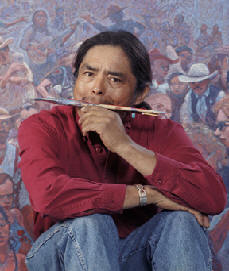In these waning days of 2012, we have lost more than a few people who have touched us all collectively in the entertainment, political and sports worlds. With that consciousness, the past couple of months also found me saying goodbye to several close relatives as they journeyed into the Spirit world. Sadly, it is an all-too-common event these days, especially on the rez it seems. It is the only time relationships and community come together bonded by tears and a sense of mortality.
Unexpectedly, I lost my cousin in early November to alcohol and exposure here in Flagstaff. I really did not get to know Wilson as well as I should have. He was a few years my junior and the son of my mother’s younger brother. Ha goneii’ Shil, na aash. My niece was the next to leave us a couple of weeks later. Hers was a result of suspected foul play that one does not put to rest easily. It is a hard time for my older brother and I can only mutely express my deepest sorrow. I did as much as an uncle could, assisting her in the trying years. A mobile home I helped her buy is one of the only remnants of her having been. It sits out there in the sagebrush flats.
Less than two weeks ago, I lost my aging uncle to the debilitating and unforgiving ravages of old age. I found comfort in the knowledge that he lived a full life. The subsequent celebration of life was full of love and food. The same day he left us, my aunt by marriage passed on as she lost her battle to breast cancer. She spent her years managing to raise a beautiful, productive family. I wish to know my cousins better. She was a widow of my mother’s younger brother; another Wilson. He was a decorated Marine veteran of the Pacific Theatre during World War II. I barely remember him as a young man, but he laughed easily and was adventurous. I was named after him years ago before I put that name to rest myself. The four relatives we lost are ones who were close in proximity and blood. Yes, in the closing days of 2012, there is a heaviness blanketing the mother there on Shonto Plateau. Ha goneii’ Shi’Ke’ii (Goodbye, my relations).
Death and words alluding to such has always been taboo among my people. When we speak of it, we always utter the word p’aah to remove ourselves from the subject and make peace with it immediately. Young children are never involved in the preparation or the execution of the burial—something about the spirit and body still at a tender age makes it best to not expose it to this harsh reality. We almost never talk about the person without thinking prayer thoughts. It is believed that special people were ones chosen to carry out the burial, people who possess the power to baffle the spirits. Strong in their ties to mysteries, these are usually the gay people. We value them.
We put aside four days in which to mourn deeply, four days of reverence and reflection. All ceremonies are suspended among distant relations and clans. We respect this so much that N’daa (Enemy Way) ceremonies were suspended when Princess of Wales died in 1997. After the fourth day, Life goes on. To hang on to the loss and grieve continuously is an act of self destruction, it is always said. This is what is meant by the Ghost Way, (Ho cho’ aajji’), a spiritual contamination that requires a cleansing ceremony. After four days, we give life fully again to the land, to the kinship, to the sense of the sacred.
These are also days of changes. Local Dineh Christian preachers are summoned. Morticians are employed and hymns sung. The funerals are a pageantry of farewells—there on sage hills and hard grounds where wind flutes cry lonely, we put to rest a part of our lives. Ha goneii’ Shi’Ke’ii.

